Also attending were Vice Chairwoman of the Ethnic Council Cao Thi Xuan; Vice Chairwoman of the Ethnic Council Tran Thi Hoa Ry; Vice Chairman of the An Giang Provincial People's Committee Le Van Phuoc; Delegation of National Assembly, People's Council and leaders of departments and branches of An Giang province.
Economic and social life of ethnic minorities develops

Scene of the working session with the People's Committee of An Giang province on the results of implementing the National Target Program on socio-economic development in ethnic minority areas
An Giang is a border province, with a natural area of 353,676 hectares and a population of nearly 1.9 million people, of which the Kinh ethnic group accounts for the majority (more than 1.8 million people), and ethnic minorities (EM) account for more than 97,556 people, with 27,471 households, accounting for more than 5% of the province's population.
In An Giang, ethnic minorities include Khmer (75,878 people, accounting for 3.98%), Cham (11,171 people, accounting for 0.59%), Chinese (5,233 people, accounting for 0.27%), the rest are other ethnic minorities living scattered in the area.
Reporting to the Delegation, the leaders of the Department of Ethnic Minorities and Religions of An Giang province informed that recently the production and life of ethnic minorities in the area have been basically stable, each ethnic group makes a living from different occupations but mainly from agriculture, fishing and trading, social security work has been well implemented.
From the National Target Program on Sustainable Poverty Reduction, the National Target Program on New Rural Development, the National Target Program on Socio-Economic Development in Ethnic Minorities, along with many other programs, projects and ethnic policies continue to be implemented by all levels and sectors with many positive results. Thereby, contributing to helping poor and near-poor households in general and poor and near-poor households of ethnic minorities in particular gradually improve their lives, develop the economy and escape poverty. The poverty rate among ethnic minorities decreases by 3-4% annually.
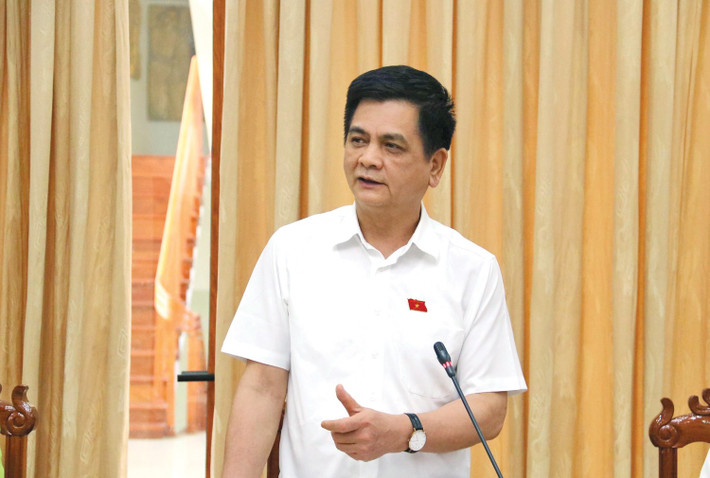
Especially with the National Target Program for Socio-Economic Development of Ethnic Minority Areas (Program), An Giang implemented 9/10 Projects and 12/14 Sub-Projects. On that basis, the Provincial People's Committee assigned 9 departments, branches and 5 districts and towns to be allocated capital as investors.
The total central and local budget capital allocated for the 2021-2025 period is 323,388 million VND, of which the central budget is 289,889 million VND; the local budget is 33,499 million VND.
Up to now, An Giang has disbursed 183,492/323,388 million VND, reaching more than 56%. Specifically, the central budget disbursed 166,166 million VND, the local budget disbursed more than 18,354 million VND.
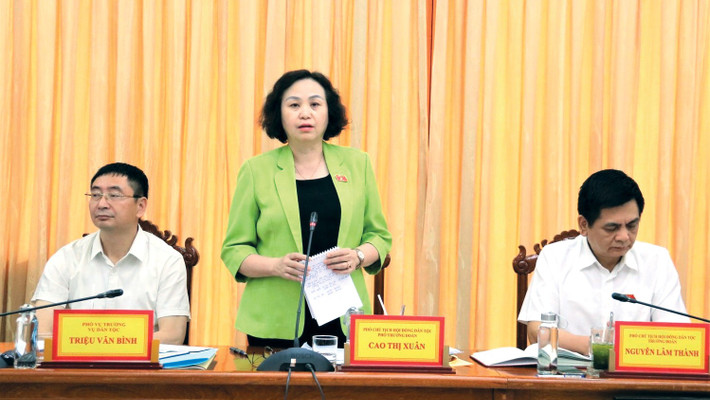
Vice President of the Council of Ethnic Minorities Cao Thi Xuan spoke at the meeting.
When implementing the Program, An Giang has proactively followed the direction of the central level to focus on handling difficulties and problems in mechanisms and policies arising at the grassroots level during the implementation process, and proposed solutions for issues beyond its authority to achieve the planned targets and objectives.
From the beginning, the Provincial People's Council and People's Committee have actively and promptly issued basically complete management and operation documents according to decentralized authority on the basis of the provisions of the Resolution of the National Assembly, the Government, and related guiding documents. Up to now, the province has basically built a policy framework that is suitable to the characteristics of An Giang.
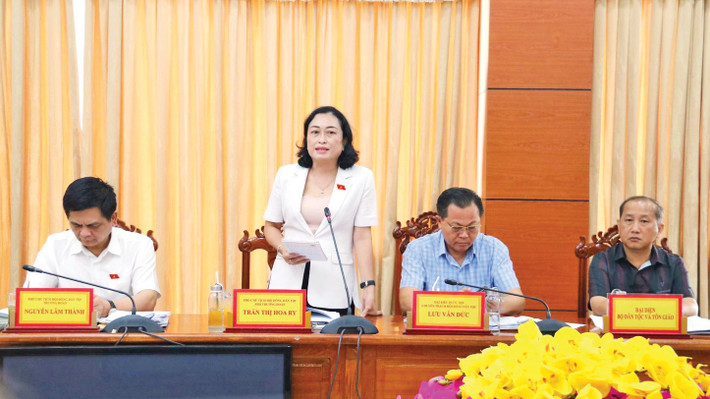
Vice President of the Council of Nationalities Tran Thi Hoa Ry speaks at the meeting
However, when implementing the projects, there are still some problems, such as: Project 1 on Solving the shortage of residential land, housing, production land, and domestic water for ethnic minorities. This project for residential land support of 44 million VND/household is actually not enough to buy land, poor households do not have the ability to respond; the majority of poor households in the area have borrowed capital, so they are not eligible to borrow more capital to buy residential land, facing many difficulties in implementation.
Furthermore, the policy of supporting land and housing for ethnic minorities is a form of direct support for each household, but it requires investment capital and must carry out procedures and documents according to investment law, thus encountering difficulties and affecting implementation progress.
Or in Sub-project 2 of Project 3 "Support for the development of precious medicinal herb growing areas", although the locality has been guided by the Ministry of Health in Circular No. 10/2022/TTBYT dated September 22, 2022, the capital has been assigned to the Department of Health for implementation, but according to the guidance of the Ministry of Health, An Giang has not met the implementation conditions so it cannot be implemented.
Regarding the implementation of Resolution No. 111/2024/QH15, An Giang Provincial People's Committee is urgently focusing on implementation. Up to now, there have been no recommendations or difficulties from project owners or local leaders.
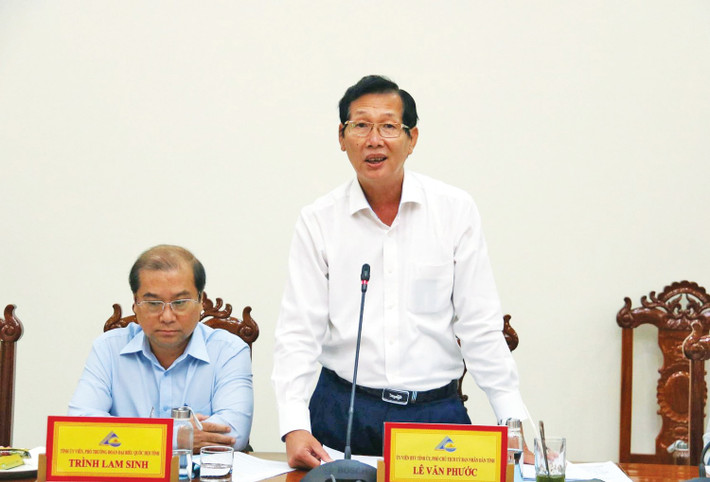
Vice Chairman of An Giang Provincial People's Committee Le Van Phuoc spoke to receive comments and contributions.
Many projects have not been disbursed
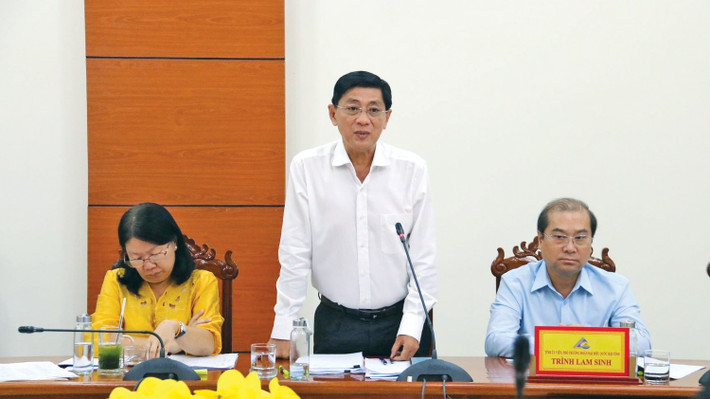
In an exchange with leaders of An Giang departments and branches, Vice Chairman of the Ethnic Council Nguyen Lam Thanh raised many issues, especially the remaining problems and difficulties when localities implement projects. In particular, Resolution No. 111/2024/QH15 opens up a mechanism for localities to implement projects according to a special mechanism; if there are any problems or difficulties during the implementation process, it is necessary to make recommendations to the Survey Team.
Vice Chairwoman of the Ethnic Council Cao Thi Xuan wondered why 3 projects (Project 3, Project 9 and Project 10) have not been disbursed yet? Localities need to pay attention and find out the reason why? Especially for career capital, the disbursement rate is still low.
Vice Chairwoman of the Ethnic Council Tran Thi Hoa Ry raised the issue that local leaders who are implementing the Program's Projects need to study which projects need to be maintained and which projects need not be implemented anymore. More attention should be paid so that policies for ethnic minorities can be effectively implemented to ethnic minorities, contributing to the Party and State in caring for and developing the lives of ethnic minorities.

In an exchange with the survey team, the leader of the An Giang Provincial Department of Health said that the unit was assigned more than 900 million VND to implement Sub-project 2 of Project 3, but there were still many issues so the capital had to be returned. The leader of the Department of Health recommended that this content should not be implemented for all provinces but should be based on the conditions of each province to arrange capital, avoiding the situation of transferring capital and then not being able to implement it, having to return the capital.
Representatives of the leaders of Tri Ton district and Tinh Bien town all expressed difficulties in supporting land and housing for ethnic minority people, because the target of 44 million VND is difficult to implement when she does not have counterpart capital, so most localities have shifted capital to providing centralized clean water for ethnic minority people.
Although economic development and poverty reduction in ethnic minority areas have achieved many good results, An Giang provincial leaders frankly acknowledged that the socio-economic development speed in ethnic minority areas is still slow, infrastructure has not met the requirements of local economic development tasks; poverty reduction results are not really sustainable.
An Giang provincial leaders proposed to strengthen decentralization and delegation of authority to the grassroots in managing and implementing projects and sub-projects; not to demarcate regions to apply policies, Because currently, ethnic minorities live intermingled with Kinh people. Therefore, if limited by region, ethnic minorities in communes and hamlets that are not in ethnic minority areas, ethnic minority households in communes with less than 15% of ethnic minority population will not have access to policies, especially poor and near-poor households, and students will not have access to schools in the ethnic boarding school system.
In addition, in the current context of streamlining the apparatus, not organizing at the district level, merging at the commune level, new approaches are needed to implement the Program for target groups and ethnic minority areas. It is necessary to focus on projects with key priorities for development investment projects, creating livelihoods for ethnic minorities in accordance with the characteristics of each ethnic group and each locality and achieving the goals of the Program.
In particular, in the next phase, An Giang proposed that the Ministry of Ethnic Minorities and Religions advise the Government to review, adjust and supplement Decision 1719/QD-TTg dated October 14, 2021 of the Prime Minister approving the National Target Program on Socio-Economic Development in Ethnic Minority and Mountainous Areas for similar projects and sub-projects between National Target Programs to bring high efficiency.
Concluding the meeting, Vice Chairman of the Ethnic Council Nguyen Lam Thanh highly appreciated the efforts of departments, branches and localities in implementing projects and sub-projects for socio-economic development in ethnic minority and mountainous areas. In particular, the leadership and management role of the Provincial People's Committee is very timely, demonstrated through directive documents; there is decentralization and delegation of power to local authorities in the spirit of Resolution 111/2024/QH15 of the National Assembly.
However, some localities have not yet implemented projects well; many projects have not been disbursed or have not been disbursed on time. In addition, coordination between departments, sectors and localities is not synchronous, leading to many projects being implemented slowly and achieving low efficiency.
Regarding the future orientation, Vice Chairman of the Ethnic Council Nguyen Lam Thanh stated that in the current context, the locality continues to invest in infrastructure, pay attention to production and business activities, especially in the agricultural sector, in which linked production models, sustainable production models, and low emissions need more investment. At the same time, the locality needs to pay attention to vocational training, so that learners have skills and can make a living from the profession they have learned, because this is also a way to help people and ethnic minorities escape poverty and have a better life.
Source: https://daibieunhandan.vn/ty-le-ho-ngheo-dong-bao-dan-toc-thieu-so-o-an-giang-giam-tu-3-4nam-post410938.html


![[Photo] Prime Minister Pham Minh Chinh chairs Government Standing Committee meeting on Gia Binh airport project](https://vphoto.vietnam.vn/thumb/1200x675/vietnam/resource/IMAGE/2025/5/10/6d3bef55258d417b9bca53fbefd4aeee)
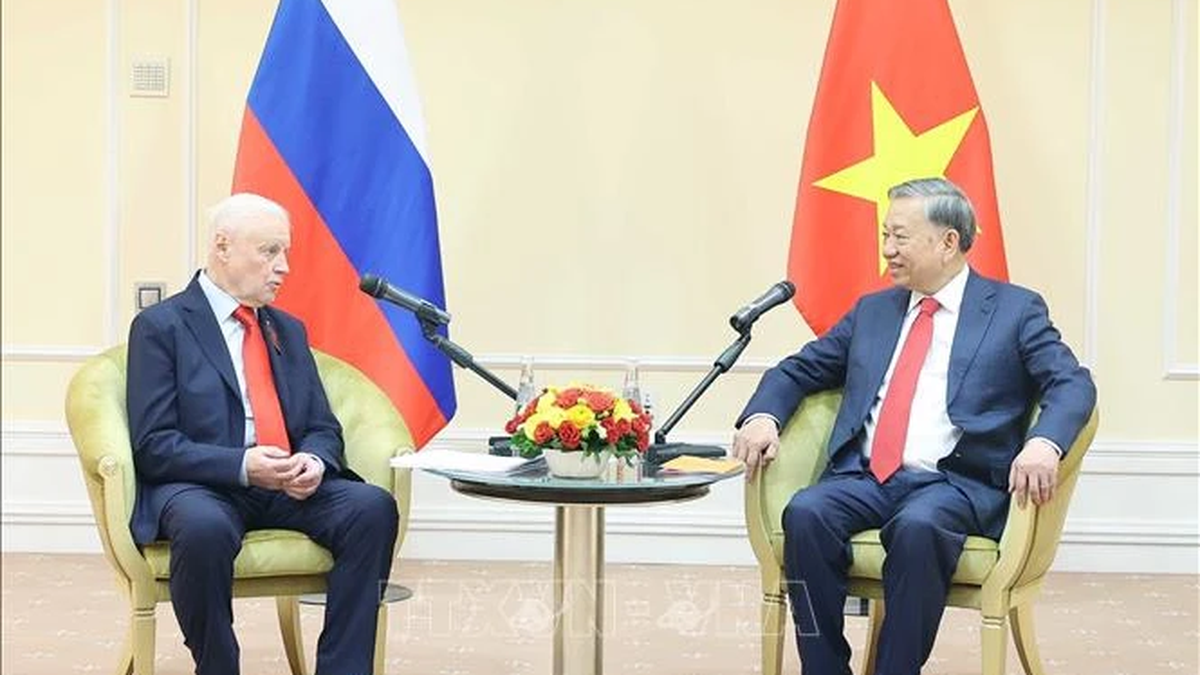






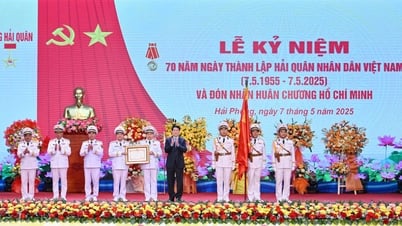
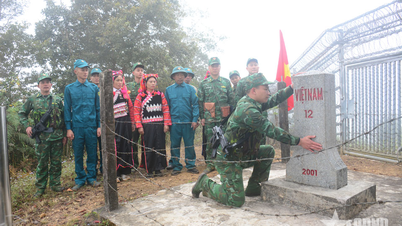































































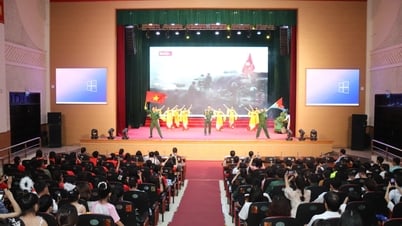
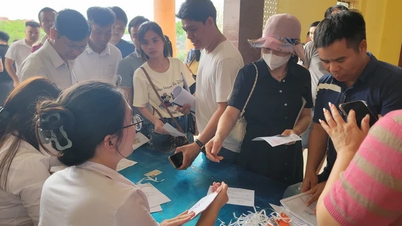











Comment (0)